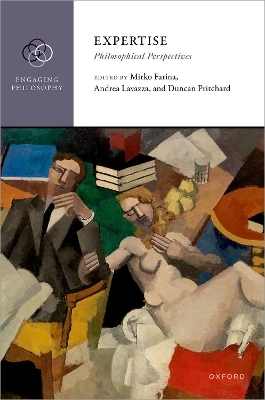
Expertise
Oxford University Press (Verlag)
978-0-19-887730-1 (ISBN)
- Noch nicht erschienen (ca. Juli 2024)
- Versandkostenfrei innerhalb Deutschlands
- Auch auf Rechnung
- Verfügbarkeit in der Filiale vor Ort prüfen
- Artikel merken
This book offers a collective study of issues to do with experts and expertise, a topic of tremendous contemporary significance. The perspectives are philosophical but draw on relevant work from the sciences and social sciences. In addition, in keeping with other volumes in Oxford University Press's Engaging Philosophy series, many of the papers in the volume have an applied dimension, in that they examine the issues in practical settings. The questions discussed include the following: What is an expert? Who decides who the experts are? Should we always defer to experts? How should expertise inform public policy? What happens when the experts disagree? Must experts be unbiased? Should all experts be treated the same, or does it matter what the source of the expertise is? How should the testimony of experts be reported by the media? The chapters in the volume are organized into six sections: expertise and trust; situated and group expertise; expertise and public policy; expertise and virtue; expertise about value; and new directions. This volume will be of interest to scholars in such fields as philosophy, sociology, political theory, psychology, cognitive science, and bioethics. It will also be of relevance to policy-makers interested in the role that expertise plays in public policy.
Mirko Farina is a philosopher and a cognitive scientist. He is a Professor (Senior Researcher) and Head of the Human Machine Interaction Lab in the Institute for Digital Economy and Artificial Systems of Xiamen City, a joint collaboration between Xiamen University and Lomonosov Moscow State University. Prior to that he was Associate Professor of Philosophy and Computer Science at Innopolis University. Andrea Lavazza is a moral philosopher and a neuroethicist. He is senior research fellow at the Centro Universitario Internazionale, Arezzo, Italy, and adjunct professor in Neuroethics at the University of Milan and at the University of Pavia, Italy, where he also teaches Philosophy of Mind. His main interests are at the intersection among ethics, epistemology, cognitive science, and new technologies. Lavazza has published over 110 papers in peer-reviewed journals and a dozen books both in Italian and in English. Duncan Pritchard is UC Distinguished Professor of Philosophy and Director of the Center for Knowledge, Technology & Society at the University of California, Irvine. He was previously Professor of Philosophy and Director of the Eidyn research center at the University of Edinburgh. His monographs include Epistemic Luck (OUP, 2005), The Nature and Value of Knowledge (OUP, 2010), Epistemological Disjunctivism (OUP, 2012), Epistemic Angst: Radical Skepticism and the Groundlessness of Our Believing (Princeton University Press, 2015), and Scepticism: A Very Short Introduction (OUP, 2019). His academic distinctions include the award of the Philip Leverhulme Prize, election to a Fellowship of the Royal Society of Edinburgh, and delivering the annual Soochow Lectures in Philosophy.
Part 1: Introduction
1: Duncan Pritchard, Mirko Farina, & Andrea Lavazza: Expertise
Part 2: Expertise and Trust
2: Massimo Pigliucci: The Problem of Pseudoscience: Who Should We Trust When it Comes to Fringe Beliefs?
3: Gloria Origgi: Authority, Legitimacy and the Expert-Layman Problem
4: Daniel DeNicola: Institutionalized Expertise: Trust, Rejection, and Ignorance
Part 3: Situated and Group Expertise
5: Lisa Bortolotti, Michael Larkin, and Michele Lim: Expertise as Perspectives in Dialogue
6: John Sutton: Affective, Cognitive, and Ecological Components of Joint Expertise in Collaborative Embodied Skills
Part 4: Expertise and Public Policy
7: Rivkah Hatchwell and David Papineau: Expert Judgement Without Values: Credences not Inductive Risks
8: Michela Massimi: From the Right to Science as an Epistemic-Cultural Human Right to the Right to Expertise
9: Harry Collins: Studies of Expertise and Experience'
Part 5: Expertise and Virtue
10: Linda Zagzebski: Humility for Experts
11: Andrea Lavazza and Mirko Farina: 1. Expertise-in-Action: The Importance of Intellectual and Moral Virtue(s) to Experts' Epistemic Authority'
Part 6: Expertise About Value
12: Dominic McIver Lopes: Experts in Aesthetic Value Practices
13: Emma Gordon: Moral Expertise and Socratic AI
Part 7: New Directions
14: Veli Mitova: Decolonising Experts
15: Duncan Pritchard: Public Expertise and Ignorance
| Erscheint lt. Verlag | 9.7.2024 |
|---|---|
| Reihe/Serie | Engaging Philosophy |
| Verlagsort | Oxford |
| Sprache | englisch |
| Maße | 156 x 234 mm |
| Themenwelt | Geisteswissenschaften ► Philosophie ► Erkenntnistheorie / Wissenschaftstheorie |
| Naturwissenschaften | |
| ISBN-10 | 0-19-887730-7 / 0198877307 |
| ISBN-13 | 978-0-19-887730-1 / 9780198877301 |
| Zustand | Neuware |
| Haben Sie eine Frage zum Produkt? |
aus dem Bereich


